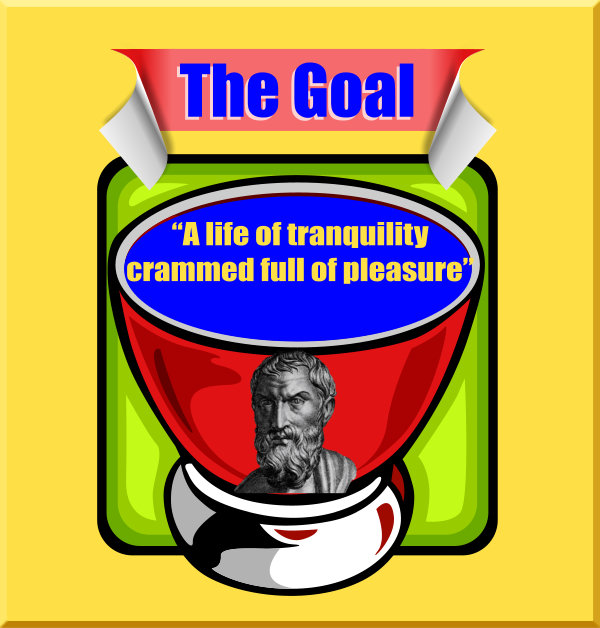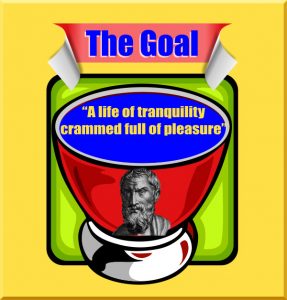Peace and Safety For Your Twentieth of July – “Conceiving The Good”
Peace and Safety to the Epicureans of today, no matter where you might be – Happy Twentieth!
On this Twentieth of July I’d like to simply highlight one short passage from Epicurus that tends to be less well known, but which comes to us with the same level of verification as any statement in any of his letters (all were preserved by the same writer – Diogenes Laertius):
“It is observed too that in his treatise On the Ethical End he writes in these terms : “I know not how to conceive the good, apart from the pleasures of taste, of sex, of sound, and the pleasures of beautiful form.”
– Diogenes Laertius, Book X
Every discussion we have about ethics and morality depends upon what we take as “the good” and “the end” of life, and we know from this passage that Epicurus devoted an entire work (now lost) to this topic, apparently titled – “On the Ethical End.” Therefore it is established with equal veracity that the same Epicurus who wrote passages which are translated “By pleasure we mean the absence of pain in the body and of trouble in the soul,” and ‘When we are pained because of the absence of pleasure, then, and then only, do we feel the need of pleasure,” also wrote “I know not how to conceive the good, apart from the pleasures of taste, of sex, of sound, and the pleasures of beautiful form.” Every student of Epicurus must decide for themselves how to reconcile these passages, but I suggest that this should not and cannot be done by throwing out the statement from “The Ethical End” as if it did not exist, as some seem to do.
I have stated what I believe to be the best means of placing these passages into the same master context at my page “The Full Cup / Fullness of Pleasure Model.” Others have different interpretations. Whatever your personal view, I urge you to think about this issue, not to throw it out as if it did not exist. No application of Epicurean philosophy can be complete without considering the plain meaning of Epicurus’ “On the Ethical End.”
Note 1: The text in the image of the cup comes from here:
Cicero, In defense of Publius Sestius, 10.23: “He {Publius Clodius} praised those most who are said to be above all others the teachers and eulogists of pleasure {the Epicureans}. … He added that these same men were quite right in saying that the wise do everything for their own interests; that no sane man should engage in public affairs; that nothing was preferable to a life of tranquility crammed full of pleasures. But those who said that men should aim at an honorable position, should consult the public interest, should think of duty throughout life not of self-interest, should face danger for their country, receive wounds, welcome death – these he called visionaries and madmen.” Note: Here is a link to Perseus where the Latin and translation of this can be compared. The Latin is: “nihil esse praestabilius otiosa vita, plena et conferta voluptatibus.” See also here for word translations.
Note 2: A similar quote is attributed to Epicurus by Cicero in Tusculan Disputations, III.18.41: “Why do we shirk the question, Epicurus, and why do we not confess that we mean by pleasure what you habitually say it is, when you have thrown off all sense of shame? Are these your words or not? For instance, in that book which embraces all your teaching (for I shall now play the part of translator, so no one may think I am inventing) you say this: “For my part I find no meaning which I can attach to what is termed good, if I take away from it the pleasures obtained by taste, if I take away the pleasures which come from listening to music, if I take away too the charm derived by the eyes from the sight of figures in movement, or other pleasures by any of the senses in the whole man. Nor indeed is it possible to make such a statement as this – that it is joy of the mind which is alone to be reckoned as a good; for I understand by a mind in a state of joy, that it is so, when it has the hope of all the pleasures I have named – that is to say the hope that nature will be free to enjoy them without any blending of pain.” And this much he says in the words I have quoted, so that anyone you please may realize what Epicurus understands by pleasure.”
________
As Seneca recorded: Sic fac omnia tamquam spectet Epicurus! So do all things as though watching were Epicurus!
And as Philodemus wrote: “I will be faithful to Epicurus, according to whom it has been my choice to live.”
Additional discussion of this post and other Epicurean ideas can be found at the Epicurean Philosophy Facebook Group and EpicureanFriends.com


